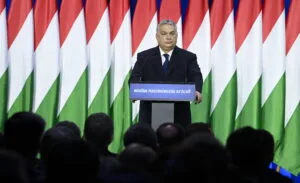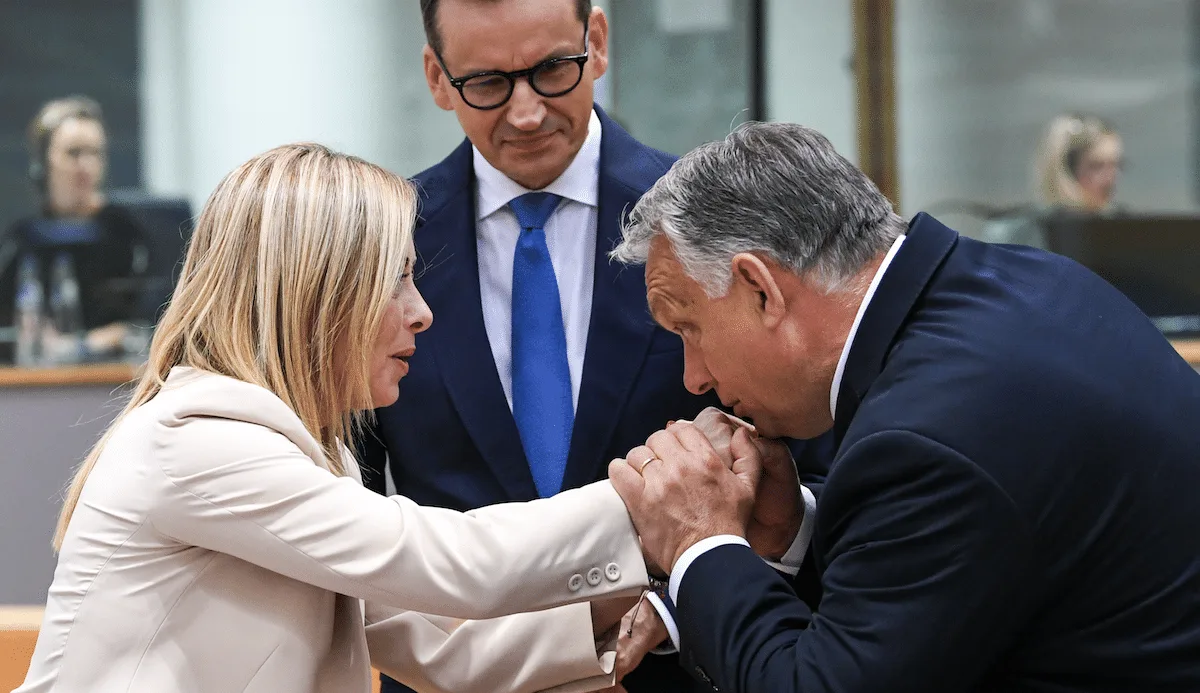Brussels – Huge street demonstrations are back in Hungary against Prime Minister Viktor Orbán, but this time, at their head is a political figure who is carving out an increasingly significant area of support in the country ahead of June’s European elections. Péter Magyar, a former leader of the ruling Fidesz party and leading politician of the centrist Respect and Freedom (TISZA) party, rallied some ten thousand people yesterday (May 5) in Debrecen, the country’s second-largest city, to launch his campaign ahead of the June 9 vote in which he will attempt to undermine Hungary’s father and master and put a spoke in the wheels of the semi-authoritarian government at the ballot box.

Yesterday’s event in Debrecen was the culmination of Magyar’s tour of Hungary’s rural heartland, where the popular support won for the first time by the newly elected leader of the opposition to Orbán—after the failure in the 2022 elections of the vast coalition led by Péter Márki-Zay—was seen in less than three months since the announcement of his joining the fray against the corruption of the ruling party. “Today, the vast majority of the population is tired of the ruling elite, hatred, apathy, propaganda and divisions,” the new rising star of Hungarian politics thus stirred up the protesters against the “entrenched mafia state” set up by the party he was part of until earlier this year. The centrist party founded in 2021 and joined by Magyar since March this year will stand with 12 candidates in the European elections, with Magyar himself the leading candidate (in addition to four candidates running in the local elections in the capital Budapest scheduled for the same day).

This is not the first time a politician has led a political
force with the avowed purpose of ousting the incumbent premier, who has held
the position since May 29, 2010. But just what went on in Debrecen, Fidesz’s historic stronghold, shows that this time, something very dangerous for Orbán’s hold on power could be stirring, starting in the Hungarian countryside where the popularity of the prime minister and his party has always held back the more progressive thrusts in the capital. After visiting dozens of rural villages, towns, and cities, Magyar proved that he was able to mobilize a sizable share of supporters where almost no other Orbán challenger had ever succeeded. “For 14 years, we have heard from the opposition that it is impossible under these circumstances to defeat Orbán, that it is not worth going to the countryside, that you cannot break down the walls of propaganda, and instead look around,” continued the new leader of the centrist TISZA force, which the polls now give at 23 per cent of the vote, just behind the coalition of Socialist Party, Greens and Democratic Coalition (24 per cent), and with Fidesz in free fall to 42 per cent (down from 53 in the 2022 national elections).
Hungary at the Orbán-Magyar Challenge
A 43-year-old lawyer, Magyar burst onto the political scene in 2010 (after Fidesz’s victory in the 2010 elections) with his appointment as an official in the Ministry of Foreign Affairs and then in Hungary’s permanent delegation to the European Union to coincide with Hungary’s rotating presidency of the EU Council in the first half of 2011. In 2015, he was hired by the Prime Minister’s Office, and three years later, he was appointed to the board of the state-owned MFB (Hungarian Development Bank). Despite his long career as a member of the Fidesz leadership, in all these years, Magyar remained virtually unknown, or at most remembered as the husband (former since 2023) of (resigned) Justice Minister Judit Varga.

It was in mid-February of this year that the political limelight began for Magyar, corresponding to a scandal that engulfed the ex-wife and Minister of Justice along with the then president of the Republic, Katalin Novàk. It had all stemmed from the pardon granted last year to the deputy director of a state orphanage, who had been imprisoned for covering up a series of sexual child abuses in the facility: the news only became public knowledge earlier this year, sparking widespread outrage and enormous street protests (lacking political leadership). That’s how public pressure forced the resignation of both direct supervisors—and both close allies of Orbán—before the election of the new president of the Republic, Tamas Sulyok. Very quickly, Magyar publicly announced his resignation from the boards of directors of two state-owned companies (and resignation from office in a third) in addition to his farewell to Fidesz, declaring a no-holds-barred fight against the Orbán government.

With the publication of some recordings dating back to 2023 of then-Minister Varga (showing that some prominent members of Orbán’s cabinet had evidence removed from court files to make their involvement in corruption cases disappear), the new opposition political figure has begun to set the campaign early on the anti-corruption agenda, also showing excellent rhetorical skills and a strategic vision on the ground inherited from years of militancy in Fidesz. Last March 15, Magyar held a rally in Budapest to announce the formation of a new party, which did not happen due to the already overdue deadline for registration for the European elections in June (three days earlier). This is how, in mid-April, the politician announced his entry into TISZA, assuming its vice-presidency and acknowledging its closeness to centrist and anti-corruption political views. At the beginning of the election campaign, Magyar has repeatedly stated that he is inspired by the French president, Emmanuel Macron and has set his communication on social media by sharing moments of everyday life with Hungarian citizens, for example, while ironing his shirt.
English version by the Translation Service of Withub


![Ilaria Salis in tribunale a Budapest [foto: imagoeconomica]](https://www.eunews.it/wp-content/uploads/2024/02/Imagoeconomica_2100386-350x250.jpg.webp)






